#Myanmar government
Text
#australian#australia#auspol#australian politics#myanmar#australian government#egypt#ghana#ethiopia#turkiye#russia#iran#palestine#uk#haiti#france#netherlands#ukraine
4 notes
·
View notes
Text
FINALLY finished that stupid ass government paper.
#i now know a ridiculous amount about the burmese government if y'all are interested ig#rip myanmar ummmm hope y'all get some help#the citizens not the military
2 notes
·
View notes
Text
Thousands of Myanmar youths flee or get married in desperate bid to avoid fascist nazi imperialist conscription
youtube
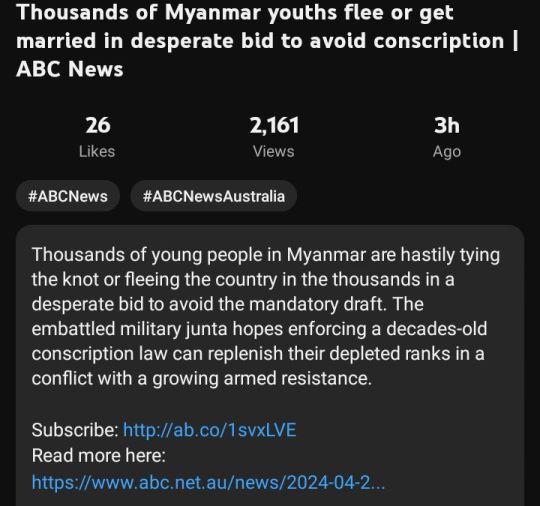
#myanmar#conscription#fascism#imperialism#statism#capitalism#anti military#fuck the military#army#navy#air force#airforce#military#military industrial complex#ausgov#politas#auspol#tasgov#taspol#australia#fuck neoliberals#neoliberal capitalism#anthony albanese#albanese government#oppression#repression#anti capitalist#capitalist hell#slavery#anti slavery
0 notes
Text
Aung San Suu Kyi has been moved from a Myanmar prison to house arrest due to heat wave
BANGKOK (AP) — Myanmar’s jailed former leader Aung San Suu Kyi has been moved from prison to house arrest as a health measure due to a heat wave, the military government said. On Wednesday it also granted amnesty for over 3,000 prisoners to mark this week’s traditional New Year holiday.
Suu Kyi, 78, and Win Myint, the 72-year-old former president of her ousted government, were among the elderly…
View On WordPress
#AP Top News#aung san suu kyi#General News#I#Myanmar#politics#prisons#protests and demonstrations#Thailand Government#War and unrest#world news
1 note
·
View note
Text
Sino-India influence in South Asia
“The gradual erosion of democracy in India and growing investment projects by China have become the catalysts for change, thus making authoritarianism a new model of governance in many countries of South Asia.”
Nayeema Ahmad Mahjoor*
Two parameters are considered significant to determine the influence and impact of any country over its neighbours. One is political philosophy or model of…
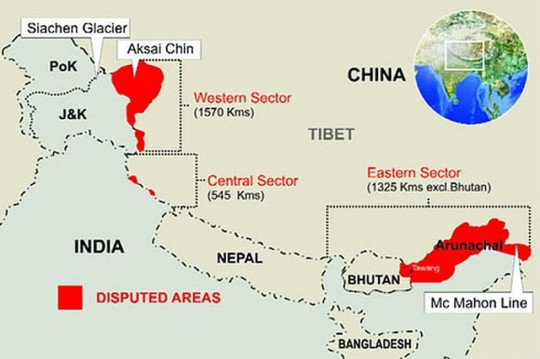
View On WordPress
#Authoritariansm a new model of governance#Balakote strikes#Bangladesh#Burma#China becomes catalyst for Change#Communist China#Conspiracy to kills Sikh leaders in Canada#Decline of Democracy in India#Diplomatic failure in South Asia#Doklam#Galwan Valley#India out slogan in Maldives#India-China relations#Killing of Muslims Minorities in Myanmar#Lakshadweep#Maldives#Myanmar#Rohingyas#Sina-India influence in South Asia#Sri Lanka#Threat to take over PAK#Trouble on borders with China#USA
0 notes
Text
[NewYorkTimes is Private US Media]
Over the past month, we’ve watched an astonishing, high-stakes global drama play out in The Hague. A group of countries from the poorer, less powerful bloc some call the global south, led by South Africa, dragged the government of Israel and, by extension, its rich, powerful allies into the top court of the Western rules-based order and accused Israel of prosecuting a brutal war in Gaza that is “genocidal in character.”
The responses to this presentation from the leading nations of that order were quick and blunt.
“Completely unjustified and wrong,” said a statement from Rishi Sunak, Britain’s prime minister.
“Meritless, counterproductive and completely without any basis in fact whatsoever,” said John Kirby, a spokesman for the United States National Security Council.
“The accusation has no basis in fact,” a German government spokesman said, adding that Germany opposed the “political instrumentalization” of the genocide statute.
But on Friday, that court had its say, issuing a sober and careful provisional ruling that doubled as a rebuke to those dismissals. In granting provisional measures, the court affirmed that some of South Africa’s allegations were plausible and called on Israel to take immediate steps to protect civilians, increase the amount of humanitarian aid and punish officials who engaged in violent and incendiary speech. The court stopped short of calling for a cease-fire, but it granted South Africa’s request for provisional measures to prevent further civilian death. For the most part, the court ruled in favor of the global south.[...]
The court was not asked to rule on whether Israel had in fact committed genocide, a matter that is likely to take years to adjudicate. Whatever the eventual outcome of the case, it sets up an epic battle over the meaning and values of the so-called rules-based order. If these rules don’t apply when powerful countries don’t want them to, are they rules at all?
“As long as those who make rules enforce them against others while believing that they and their allies are above those rules, the international governance system is in trouble,” Thuli Madonsela, one of South Africa’s leading legal minds and an architect of its post-apartheid Constitution, told me. “We say these rules are the rules when Russia invades Ukraine or when the Rohingya are being massacred by Myanmar, but if it’s now Israel butchering Palestinians, depriving them of food, displacing them en masse, then the rules don’t apply and whoever tries to apply the rules is antisemitic? It is really putting those rules in jeopardy.”[...]
The military campaign has “wreaked more destruction than the razing of Syria’s Aleppo between 2012 and 2016, Ukraine’s Mariupol or, proportionally, the Allied bombing of Germany in World War II,” the report quoted researchers as saying. The researchers, hardly some raving left-wing activists, are experts cited in one of the most respected news organizations in the world, The Associated Press.[...]
The International Court of Justice issued a nonbinding opinion in 2004 that the security barriers Israel was erecting in the West Bank violated international law, but that ruling has had no effect. The walls still stand.[...]
Indeed, what is a rules-based system if the rules apply only selectively and if seeking to apply them to certain countries is viewed as self-evidently prejudiced? To put it more simply, is there no venue in the international system to which the stateless people of Palestine and their allies and friends can go to seek redress amid the slaughter in Gaza? And if not, what are they to do?
For the cause of Palestinian statehood, every alternative to violence has been virtually snuffed out, in part because Israel’s allies have helped to discredit them. The most recent example is the boycott, divestment and sanctions movement that has, in many places, been successfully tarred as antisemitic or even banned altogether. Efforts to use the United Nations Security Council have drawn U.S. vetoes for decades. Is seeking redress at the appropriate venue for alleged violations of international law also antisemitic, as Israel’s defense minister said on Friday? Does no law apply to Israel? Are there no limits to what it may do to defend itself?[...]
The Biden administration has made the shoring up of the international rules-based order a centerpiece of its foreign policy but, unsurprisingly, has struggled to live up to that aspiration.[...]
Occasionally straying from your principles because circumstances require it is very different from being seen to have no principles at all, and that is precisely how much of the global south has come to regard the United States.
It seems especially shortsighted in these times that the Biden administration elected to wave away the carefully documented case prepared by South Africa. One of the biggest threats to the rules-based international order is the growing consensus in the poor world that the rich world will apply those rules selectively, at its discretion, when it suits the powerful nations that make up the global north, such as when Russia invaded Ukraine.[...]
As far as the rules-based order is concerned, when it comes to crimes like genocide and ethnic cleansing, it simply does not matter who started it. [...] The best way to shore up the rules-based order is to be seen, in word and deed, as committing to the institutions and moral commitments of that order.
28 Jan 24
1K notes
·
View notes
Text
UN expert questions sincerity of Myanmar's prisoner release
UN expert questions sincerity of Myanmar’s prisoner release
SEOUL, South Korea — The recent release of thousands of prisoners in Myanmar is likely an attempt by its military-controlled government to “create a veneer of progress” in the country to sway international opinion, a U.N. expert said Monday.
Myanmar freed about 5,700 prisoners on the occasion of the National Victory Day last Thursday. Among them were foreign nationals — an Australian academic, a…
View On WordPress
#Arrests#asia#aung san suu kyi#Crime#east asia#General news#Government and politics#Human rights and civil liberties#Law and order#myanmar#Seoul#Social affairs#Social issues#South Korea#southeast asia#United Nations
0 notes
Text
Ethnic cleansing? Genocide? Apartheid?
Throwing around these buzzwords to describe the Israel-Hamas war because you’ve seen them on social media doesn’t make you right, and it doesn’t make you an activist.
It makes you ignorant, intellectually dishonest, and lazy for parroting biased talking points with no concept about what these terms actually mean.
What is apartheid?
Well, it was first used to describe the political system in South Africa and today’s Namibia whereby racism was institutionalised. This manner of governance meant that clear racial segregation would occur, in a manner that benefited the white race and would actively oppress those who had darker skin.
This meant that there were white-only spaces, white people would get prioritised when it came to education and jobs, and relationships/marriages between white peoples and coloured people were illegal.
Is Israel objectively an apartheid state? There are no laws that actively favour one group over the other. There is a sizeable population of Israeli Arabs that can thrive in the same way as the Israeli Jews can. There are laws against discrimination on the basis of gender, race/ethnicity, and sexual orientation.
Palestinians from Gaza are allowed to work in Israel through a work permit system. There are about 150,000 Palestinians working in Israel, most of which live in Israel and some come from Gaza/the West Bank. They aren’t denied rights institutionally.
Is it harder to get a job or education in Israel if you’re a Palestinian from Gaza? Sure, because of different governments. It’s like how it’s a lot easier for you to find a job in your own country (in terms of paperwork and bureaucracy) than overseas. But you’re not denied the right to apply.
Of course, if you have a history of violence, a criminal record, or your family has ties to terrorists, then it’ll be a lot harder to get an approved work permit. But that’s not apartheid. That’s common sense, and a regulation practiced by all countries that minimally desire to protect their own population from danger.
Ethnic cleansing and genocide
These two concepts can go hand-in-hand. Ethnic cleansing refers to the mass expulsion or killing of a group of people based on their ethnicity. Similarly, genocide is the purposeful killing of a group of people solely with the intention of annihilating them.
Famous examples? The Holocaust, of course, where the Nazi regime believed in the superiority of the Aryan race and decided to declare genocide on the Jews, Romanis, the LGBTQ+ community, people with disabilities, people with “Asian features”, and many many other groups. Anyone who they didn’t think was “pure”.
Their aim was to ensure that the Aryan race propagated without having “impure” blood affecting the bloodlines. They even started a eugenics programme called Lebensborn to ensure that more pure Aryan babies were born.
More recent examples? The Rwandan genocide where the Hutus attempted to wipe out the Tutsis on the basis of ethnicity. They mandated that Tutsis mention their ethnicity on state-issued ID cards in order for the Hutus in power to be able to identify them and then kill them.
Or the Yazidi genocide which happened so recently, in which ISIL killed, raped, and sent thousands of Yazidis into conversion camps on the basis of their ethnicity. They also took Yazidi women as sex slaves and raped and tortured them.
Or the Rohingya Muslims in the Rakhine State in Myanmar, and how there was a mass killing and expulsion of them from the country, forcing them to flee to Bangladesh to take refuge, crating the world’s largest refugee camp.
Or how ISIS killed thousands of people from Christian groups in Iraq, Syria, Egypt, and Libya because of their faith, leading the US, EU, and UK to label this as religious genocide and condemned their actions.
Has Israel been practicing ethnic cleansing and genocide on Palestinians all these years?
Well, the birth rate of the Palestinian population in Gaza, the West Bank, and in Israel has been steadily increasing all these years.
So, no. No ethnic cleansing, no genocide. They are free to have as many children as they desire.
The UN Genocide Convention
The United Nations has 5 actions that constitute genocide.
1. Killing members of a target group
Israel is targeting Hamas officials with the aim of wiping out the terrorist group and ensuring that such a deadly attack on Israeli soil doesn’t happen again. I suppose you could call it genocide against Hamas, but they’re killing Hamas because they’re terrorists, not because they’re Palestinian. Shouldn’t everyone believe in genocide against terrorists?
But look at Black Saturday. Look at Hamas’ rhetoric. They repeatedly call for the annihilation of Israel and genocide of Jews. When will the media start believing what they say, word for word, instead of trying to spin it into “hmm maybe they want to kill all the Jews because they’re freedom fighters!”
War has collateral damage. Of course the innocent civilians don’t deserve to suffer just because of the actions of their government, but there have been warnings given to the Palestinian civilians prior to Israel striking the areas. There are consequences of attacking a country first, and then having that country attack you back.
2. Causing people of the group serious bodily or mental harm
The UN refers to sexual violence as the prime example of non-fatal harm.
Sexual violence has occurred. Hamas have kidnapped and raped women and even paraded the bodies of half-naked women around. But I f Israel had done the same, it’ll be the first thing appearing on everyone’s BBC push notifications (without even being confirmed as true).
3. Imposing living conditions intended to destroy the group
Many people refer to the blockade that Israel imposed around the Gaza Strip as an example of this.
This blockade was imposed by both Israel and Egypt in 2005. Its aim was to prevent smuggling of weapons into Gaza, and isolate the reign of Hamas to the region. This was to ensure the safety of Israel and Egypt.
Did this blockade pose serious challenges to the Gazan civilians? Of course. But that’s a consequence of having a terrorist government. If you have a terrorist group running your country, don’t be surprised if neighbouring countries are extra careful about who or what they allow in or out of the borders.
Many authorities from other Arab nations have also expressed approval of Egypt’s border restrictions, and even encouraged Egypt to flood the terror tunnels that Hamas has dug under the city. As a side note, other Arab nations have not historically been very kind or welcoming to Palestinians. Syria has killed over 4000 Palestinians, and many Arab countries are now refusing any refuge for Palestinians. But no one cares about that because it doesn’t make Israel look bad. All they do now is use the images of dead Palestinians under the hands of Syria and reuse them to propagate fake news.
The blockade has been labelled as a human rights violation because of collective punishment. Many humanitarian organisations believe that the blockade has caused the Palestinian civilians disproportionate harm.
Contrary to popular belief, Israel isn’t disallowing humanitarian aid from coming through the borders. Fuel, food, hygiene products, clothes, and shoes have been coming through the borders regularly for years. The Gaza Strip also has electricity and internet access and water.
Do all these items reach the Palestinian civilians? Well, there has been evidence that Hamas has been intercepting a lot of the supplies sent by humanitarian groups. This is not surprising since the UNRWA tweeted that Hamas has stole fuel from hospitals in Gaza in order to launch more rockets at Israel (but quickly deleted it after realising that it goes against their agenda to paint Hamas in a bad light.) In addition, the returned hostages have mentioned that there are many aid supplies hidden in the terror tunnels by Hamas. Instead of giving them to the civilians, they are hoarding it for themselves.
There has also been video evidence that some people are reselling these aid items in stores at exorbitant prices in order to turn profits. This has been well-documented for the last 10 years.
Is blockading the region to mitigate terrorism a disproportionate response? Well, it’s like asking if heightened security and stricter border control at airports is a disproportionate response after 9/11. Is being cautious and worrying about the security of your country an irrational reaction to the constant threat of terrorism?
4. Preventing births
Gaza’s population growth rate per annum is about 1.99%, which is the 39th highest in the world! Their population is allowed to propagate freely.
Israel isn’t preventing births of Palestinian babies.
5. Forcibly transferring children out of the group
No, Israel hasn’t been taking Palestinian children and forcing them to convert/keeping young Palestinian girls as sex slaves. Like I said, if this was truly happening, all the news outlets would be so quick to publish the story before verifying it.
Can we trust the UN Genocide standards?
The UN is known for corruption and have been exploiting the Palestinian people by selling them the humanitarian supplies instead of distributing them for free, which they should because these supplies literally are donations.
The UN also has differing standards of what they would label as genocide. For example, they refuse to call what China is doing to the Uyghurs in Xinjiang as genocide, even though the situation does fit many of their own criteria.
Hence, to all of you out there overusing these terms without knowing what they mean, make up your own mind about things. No one can force you to believe anything and no one can force you to change your mind.
But at the very least, do your due diligence and educate yourself before spouting tired buzzwords. Repeating misinformation doesn’t help anyone and can be very harmful.
#i stand with israel#israel#palestine#gaza#stop hamas#pro israel#am yisrael chai#hamas#fuck hamas#hypocrisy#i support israel#using buzzwords doesn’t make you smart#do your homework#do your own research#unrwa is a scam#make up your own mind#reading Al Jazeera headlines isn’t education#media bias#call out fake news#stop fake news#stop anti semitism
930 notes
·
View notes
Text
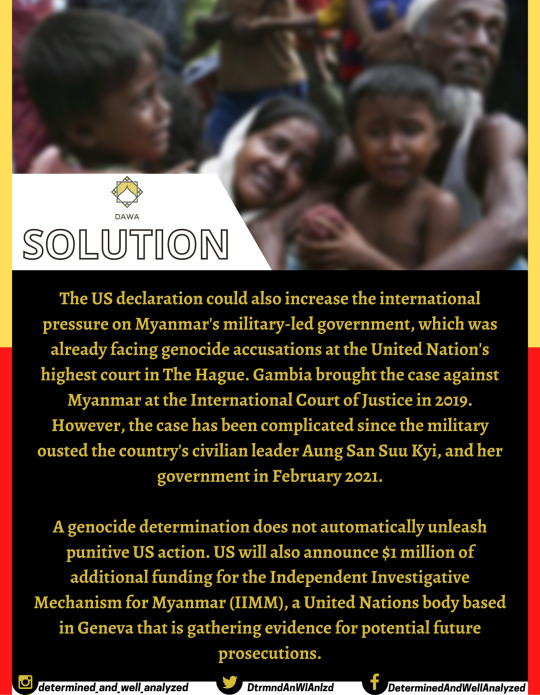
A genocide determination does not necessarily mean fresh punitive measures against Myanmar. The formal declaration of genocide could be followed by further limits on aid and other penalties. US also believes it will bolster international efforts to hold the junta accountable.
#solution#us#declaration#international#myanmar#military#government#united nations#court#the hague#gambia#justice#country#civilian#leader#action#million#funding#mechanism#geneva#future#evidence#aid#measures#announce#deal#at#weekly#act#dawa
0 notes
Text
Myanmar's Shadow Government to Create Its Own Police Force | World News
Myanmar’s Shadow Government to Create Its Own Police Force | World News
(Reuters) – A parallel government opposed to military rule in Myanmar announced on Tuesday it was forming its own police force, in its latest effort to hamper the junta’s efforts to govern after a coup last year.
Myanmar has been in turmoil since the overthrow of Aung San Suu Kyi’s elected government, which ended a decade of tentative democracy and sparked nationwide opposition by groups…

View On WordPress
#Collections: World#create#crime#force#Government#Myanmar#Myanmars#News#Police#Reuters#Shadow#World#World News
0 notes
Text
the 10 crises the world must not look away from:
1. SUDAN
24.8 million people in need of humanitarian aid. a still-escalating war brings sudan to the top of the watchlist. fighting has more than doubled humanitarian needs in less than a year and displaced 6.6 million people- bringing the country to the brink of collapse. more people are internally displaced within sudan than in any other country on earth. in darfur, human rights groups have reported mass killings and forced displacement along ethnic lines.
2. PALESTINE
3.1 million people in need of humanitarian aid (gaza and the west bank). gaza enters 2024 as the deadliest place for civilians in the world. i*****i airstrikes and fighting have had a direct and devastating impact on civilians that will continue to grow as hostilities persist into early 2024, at least. with more than 18,700 palestinians killed, 85% of the population displaced, and over 60% of gaza's housing units destroyed, people living in gaza will struggle to recover and rebuild their lives long after the fighting ends.
3. SOUTH SUDAN
9 million people in need of humanitarian aid. the war across the border in sudan threatens to undermine south sudan's fragile economy and could add to political tensions in the run-up to the country's first-ever elections. meanwhile, an economic crisis and increased flooding have impacted families' ability to put food on the table. a predicted fifth year of flooding could also damage livelihoods and drive displacement.
4. BURKINA FASO
6.3 million people in need of humanitarian aid. as the burkinabè military struggles to contain armed groups, violence is rapidly growing and spreading across the country. roughly 50% of the country is now outside government control.
5. MYANMAR
18.6 million people in need of humanitarian aid. the conflict in myanmar has spread significantly since the military retook political power in 2021. 18.6 million people in myanmar are now in need of humanitarian assistance - nearly 19 times more than before the military takeover. myanmar has seen decades of conflict, but in oct. 2023, three major armed groups resumed clashes with the government. over 335,000 people have been newly displaced since the latest escalation began.
7. MALI
6.2 million people in need of humanitarian aid. dual security and economic crises are driving up civilian harm and humanitarian needs. conflict between the military government and armed groups will likely escalate.
8. SOMALIA
6.9 million people in need of humanitarian aid. somalia faces heightened conflict and climate risks after a record drought. more recently, widespread flooding has displaced more than 700,000 people and will likely continue into early 2024.
9. NIGER
4.5 million people in need of humanitarian aid. a coup in july 2023 triggered massive instability that risks a rapid worsening of the ongoing humanitarian crisis in the country.
10. ETHIOPIA
20 million people in need of humanitarian aid. communities across the country are facing the twin threats of multiple conflicts and the likelihood of el niño-induced flooding. the nov. 2022 ceasefire between the government of ethiopia and the tigray people's liberation front (TPLF) continues to hold in northern ethiopia, but other conflicts, particularly in the central oromia region and in amhara in the northwest, are fueling humanitarian needs and raising the risk of a return to large-scale fighting.
11. DEMOCRATIC REPUBLIC OF CONGO
25.4 million people in need of humanitarian aid. weak state capacity has exposed many congolese to one of the world's most protracted crises, driven by conflict, economic pressures, climate shocks and persistent disease outbreaks. now, a resumed offensive by the M23 armed group is driving up conflict and humanitarian needs. the country enters 2024 with 25.4 million people in need of humanitarian assistance - more than any other country on earth. the magnitude of the crisis has strained services, created high levels of food insecurity and fueled the spread of disease.
— via my.linda__ on instagram
435 notes
·
View notes
Text
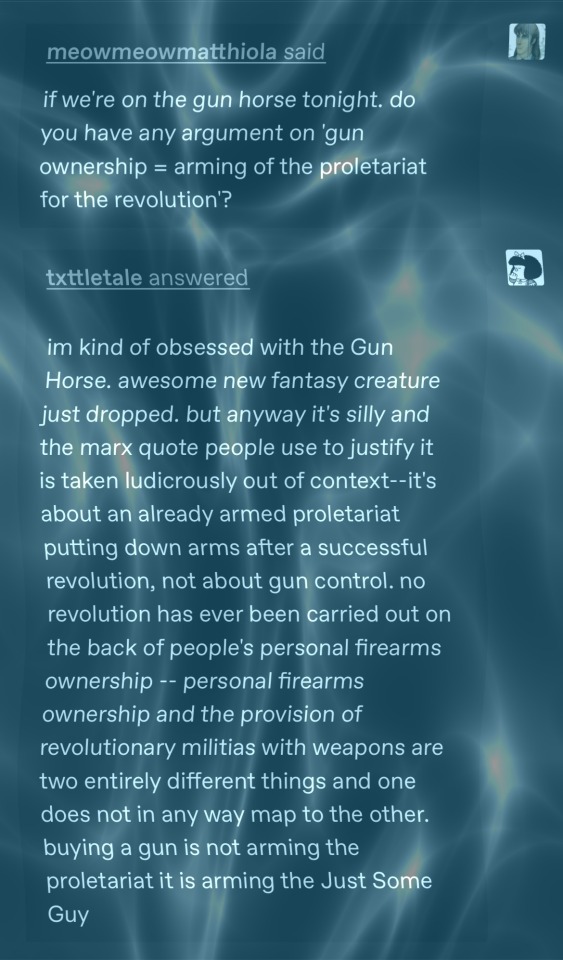
Gee I wonder how common private gun ownership was right before the Russian revolution? Oh wait it was actually common and civilians could easily buy firearms. Here’s a print ad from the time:
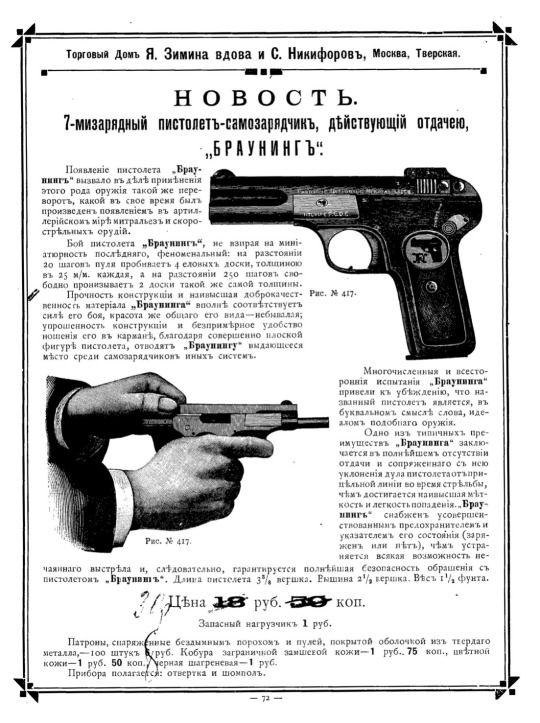
Historically, many revolutions and civil wars involved the use of privately owned firearms. A really common pattern that you see going back hundreds of years is that at the outbreak of conflicts, civilians would form militias, arm themselves with whatever they could get their hands on, storm government armories, and then steal everything not nailed down.
During the Yugoslav civil war, the UN enacted an arms embargo on all sides of the war from Sept 1991 through the end of the war. The VRS split off from the JNA, so they just took those weapons with them. However, the ARBiH had to acquire weapons from a lot of different sources, such as:
Stolen from JNA barracks
Stolen from Yugoslav police
Taken out of museums (Yes, really. They were literally using vintage captured MG42s from WWII)
Handmade (!) (Yes, really. I saw handmade guns that were used in the war on display in a museum in Sarajevo)
Smuggled in by Pakistani Intelligence Services (Specifically anti-tank missiles)
Picture: A group of ARBiH soldiers at the Old Bridge in Mostar, June 1992. The man on the far right is carrying a Winchester Model 70 (captured from a Serb, who purchased it in Montana)
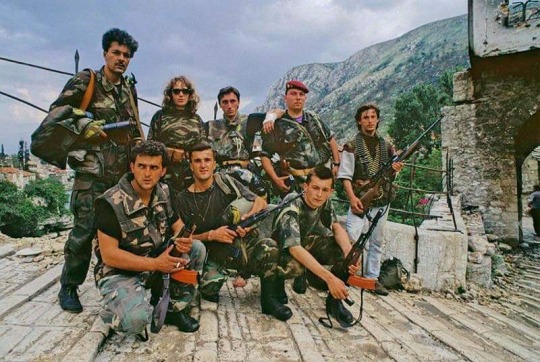
Picture: Two ARBiH soldiers, the one on the right is carrying an MG42.
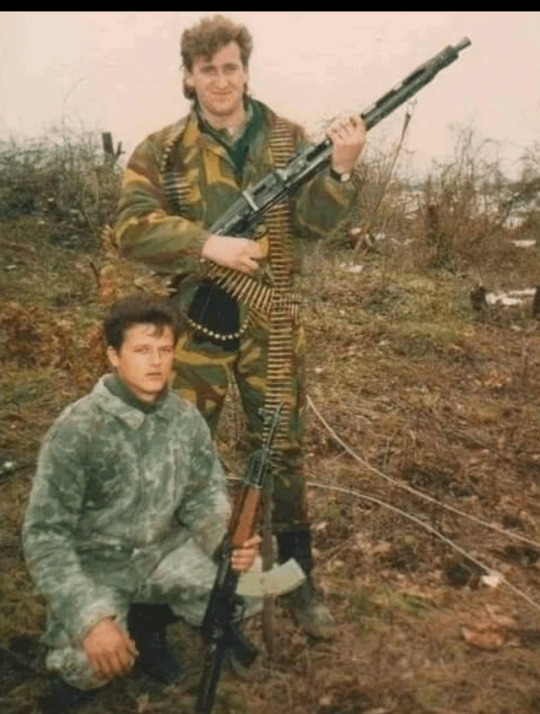
Another conflict (or, more accurately, long series of conflicts) that we can also look to is the American Indian Wars. Native American combatants used a variety of weapons, but the weapons that they prized most highly were contemporary repeating rifles. Famously, repeating rifles such as the Henry lever-action rifle were contributing factors to the victory of Lakota and Cheyenne forces at the Battle of Little Bighorn in 1876. (Native Americans had been purchasing guns for hunting and combat for over a hundred years at that point. One of the earliest accounts of such a purchase was in 1750 where French traders traded flintlock muskets for horses from Wichitas and Comanches.)
Picture: The Apache military leader Geronimo, on right, accompanied by three younger warriors, 1886.
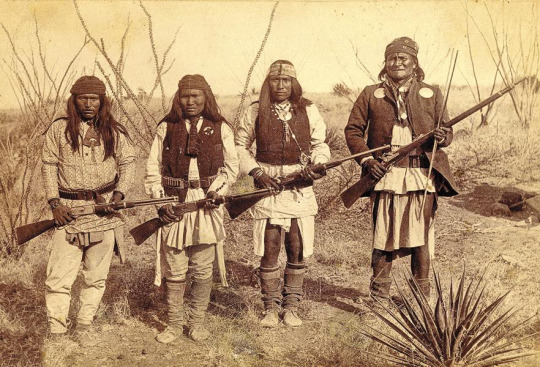
Let’s take another, ongoing example: The Myanmar civil war (2021- present, as of April 2024).
Fighters in the coalition of anti-junta forces use a wide variety of small arms, but most relevant for this post is the manufacturing and use of the FGC-9, a 9mm carbine compatible with Glock magazines.
(Side note: FGC stands for Fuck Gun Control.)
The FGC-9 design uses a combination of 3D-printed parts and easily-manufactured pressure-bearing metal parts.
Picture: a People’s Defense Force soldier carrying an FGC-9.
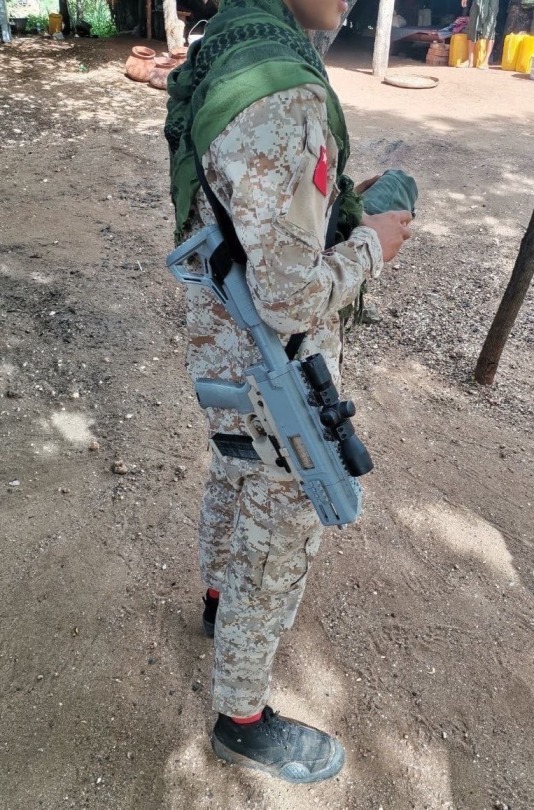
If you genuinely believe that there will be a revolution or civil war in your country in the future, then logically it is 100% reasonable to buy and train with guns right now.
If you genuinely believe that there will be a revolution or civil war in your country in the future, it makes absolutely no sense to hand-wave that away with “one day when the exact right circumstances emerge for a proletarian mass movement to Do Revolution, only then will we acquire even one single firearm. I’m just going to assume there won’t be massive obstacles such as arms embargoes, government crackdowns, or supply-chain issues that could completely stymie our ability to do that.”
If you genuinely believe that there will be a revolution or civil war in your country in the future wouldn’t it be better for the people on your side to already have some level of training & skill with firearms?
If you live in a country where the right wing has spent decades buying guns and salivating over the idea of starting a civil war and killing left-wingers and minorities, do you think it is a good idea to discourage left-wingers and minorities from buying guns?
168 notes
·
View notes
Text
broskies i need to sleep so i can actually write my paper that's due on tuesday AND do my physics work tomorrow
#physics shouldn't take long it's like a page abt electric potential energy n shit#but that paper....i detest government.....#although the political history of myanmar is fascinating i will say
0 notes
Text
Call for International Solidarity with FGWM Union in Myanmar
#fgwm#pro union#unions#trade unions#unionize#myanmar#union strong#union#solidarity#humanrights#ausgov#politas#auspol#tasgov#taspol#australia#neoliberal capitalism#fuck neoliberals#anthony albanese#albanese government
0 notes
Text
Unconventional warfare constituted the US method of choice to weaken or overthrow unwanted governments. It was designed to “roll back” governments deemed detrimental to US interests and those of global capital. Such strategies depended almost entirely on para-institutional complexes. US agencies liaised with and coordinated complexes of local collaborators, insurgents, militias, “secret” armies, mercenaries, private air-military contractors and other para-institutional forces to influence the political and economic orientation of foreign states. These efforts to weaken unwanted foreign governments or towards regime change extended around the world to countries such as Albania (1949–53), China (1949–60s), Burma (Myanmar) (1951–53), Tibet (1959–60s), Iran (1953), Guatemala (1954), Syria (1956–57), Egypt (1957), Indonesia (1957–58 and 1965), Iraq (1963), North Vietnam (1945–73), Cambodia (1955–70), Laos (1958–63), Cuba (1959–present), Chile (1964–73), Greece (1967), Bolivia (1971), Zaire (1975), Angola (1975, 1980s), Seychelles (1979–81), Libya (1980s), Grenada (1983), South Yemen (1982–84), Nicaragua (1981–90), (Afghanistan 1979–89), Fiji (1987), among others.
Andrew Thomson, Outsourced Empire: How Militias, Mercenaries, and Contractors Support US Statecraft
130 notes
·
View notes
Text
Before I knew about the genocide in Palestine I learnt about the one ongoing in West Papua.
youtube
youtube
I will always make sure that people hear me at least mention that while Indonesia opposes the genocide Israel is commiting they are commiting their own against the indigenous tribes, some of which are fighting against modern warfare tech with spears.
I will always mention that Sudan is undergoing its own genocide. As a strong ally of Palestine many Palestinian refugees sought safety in Sudan in previous years, however in April/May last year 281 Palestinians were evacuated from Sudan by the Palestinian Embassy because of the ethnic killings of the Masalit people.
The Democratic Republic of Congo has been a long time ally of Israel, which isn't surprising when the multiple conflicts that have happened and are still happening has led to 6 million people being killed since 1996 in the DRC.
Armenia, also a supporter of Palestine, is facing a genocide from Azerbaijan. Just last year 200+ civillians in the Nagorno-Karabakh region were injured by invading Azerbaija, and over 100,000 civilians were forced to flee.
Myanmar is also a longtime supporter of Israel, and Israels influence can clearly be seen in the Myanmar government's brutal attacks on the Rohingya people.
China, who has undoubtedly helped push for a permanent ceasefire in Gaza, isn't innocent either. There is an ongoing genocide being committed against the Uyghur people in Xinjiang.
In Ethiopia its estimated that at least 800,000 people have been killed in Tigray by Ethiopian Government forces.
#Youtube#gaza#free gaza#israel#palestine#free palestine#genocide#ethiopia#west papua#sudan#democratic republic of the congo#drc
66 notes
·
View notes